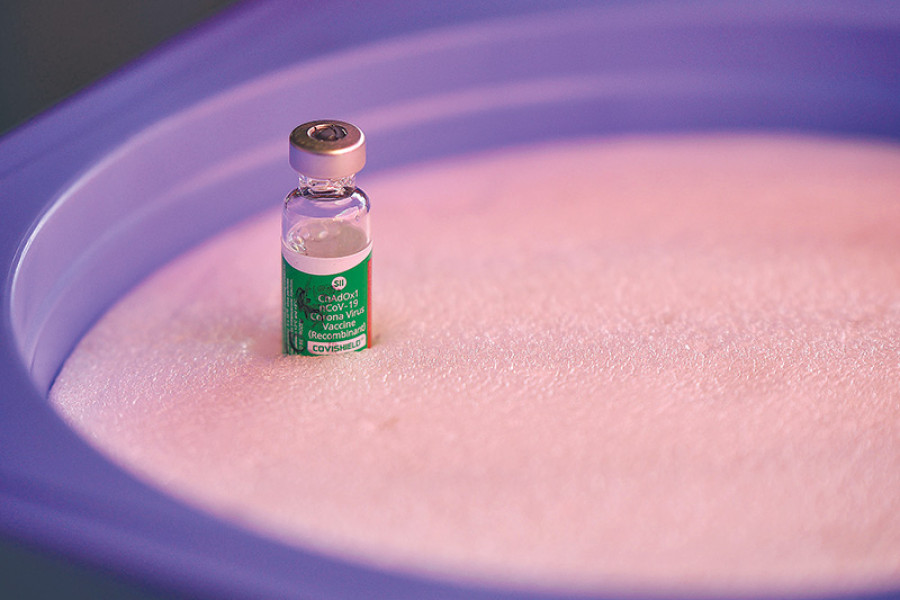Health
Plan to procure 4 million Covid-19 vaccines in final phase, ministry says
Those above 60 will get vaccines after a month. Nepal began its drive to inoculate 430,000 frontline workers last week and 158,487 people have received the jab so far.
Arjun Poudel
With the plan to procure four million doses of the Covid-19 vaccine from India in the final phase, the government intends to immunise those above 60 years after a month.
“We will start inoculating people above 60 after a month,” Dr Roshan Pokhrel, chief specialist at the Ministry of Health and Population, told the Post. “We will extend the immunisation centres to the local level to immunise the targeted population.”
The government hopes to administer the first dose of vaccine to those above 60 along with the second dose to the health workers and other frontline workers who have been getting the first dose since last week.
The additional four million doses are also of the Covishield vaccine developed by the University of Oxford and pharmaceutical giant AstraZeneca, which is being produced by the Serum Institute of India. It is the preferred choice of Nepali authorities since the existing storage and transportation infrastructure used in the country to immunise children can be utilised for its use.
Covishield vaccines have to be stored in plus temperatures between 2 and 8 degrees Celsius.
India on January 21 gave a million doses of Covishield as a grant with which the government planned to inoculate 430,000 people. The government began the Covid-19 vaccination drive in Nepal on January 27 and hopes to complete administering the first dose by Saturday but only 158,487 of the targeted people have taken it until Thursday, according to the Ministry of Health and Population.
They were vaccinated at district hospitals and primary health centres.
The second dose has to be administered after 28 days after the first dose.
On Wednesday, the World Health Organization’s COVAX facility announced that it will provide 2,256,000 doses to Nepal by the end of February.
“Procurement process is in the final phase to buy four million doses of Covishield vaccines, and the UN health agency also will provide us with the same vaccine,” added Pokhrel. “It will not be a problem for us to run an immunisation programme for an additional population along with those who already received the first dose, as the same vaccine will be used for both groups.”
According to the first interim distribution forecast published by COVAX on Wednesday, the UN health agency will provide Covishield to Nepal.
The vaccines to be provided by the UN health agency will be sufficient for 3.3 percent (around one million) of Nepal’s 30 million population, as around 10 percent of the doses tend to get wasted in general, according to doctors.
Vaccines for 20 percent of the population will be provided by the UN health agency under its COVAX programme.
Nepal needs to vaccinate 72 percent of its people against Covid-19, as children up to 14 years of age constitute 28 percent of the population and no vaccine against Covid-19 has been trialled as of now on individuals under 14.
Covishield, however, can be administered only to people above 18 years as it has been trialled only on those above this age.
“We will make necessary preparations to roll out vaccines to wider populations,” Dr Jhalak Sharma, chief of the Child Health Section at the Family Welfare Division under the Department of Health Services, told the Post. “Next phases of the immunisation programme will be extended to the ward level and immunisation workers will be trained accordingly. We will immunise the people as per the priority list we have made.”
The Health Ministry says those over 60 will be immunised with the four million Covid-19 vaccines and the vaccine provided by the UN’s health agency under its COVAX programme.
After inoculating people over 60, those over 55 will be immunised. People in the 40 to 55 years age group are the third priority and those under 40 are fourth priority.
The Health Ministry said that 2,256,000 doses of vaccines will come in the first phase and the rest of the jabs (16.7 percent) may come in different lots.
“As per our understanding, once the vaccine starts being delivered [under the COVAX facility], the gap will not be too long,” Sharma added.
Doctors say that authorities should continue enforcing preventive measures including use of face masks, social distancing, and hand washing to stop the transmission chain of the virus, as it will take a long time to immunise all eligible Nepalis.
“Along with the immunisation, curbing deaths and infection of the virus is equally important,” Dr Prabhat Adhikari, an infectious disease and critical care expert, told the Post. “Authorities should also pay attention to it.”
The Health Ministry said that the first phase of vaccination will be concluded on Saturday. “We will complete this phase even if all people of the targeted group do not seek immunisation,” added Sharma, chief of the Child Health Section.
“Those who were on the first priority list but did not take the jabs will only get vaccinated later at their convenience but along with the general population.”
When all Nepalis will get vaccinated against Covid-19 remains unclear.
“We will immunise the people as per the priority lists we have made,” Sharma added. “But immunisation depends on the availability of the doses of vaccines.”




 9.7°C Kathmandu
9.7°C Kathmandu















